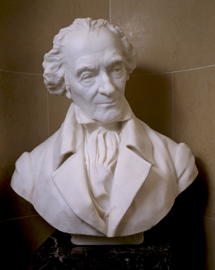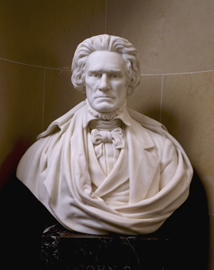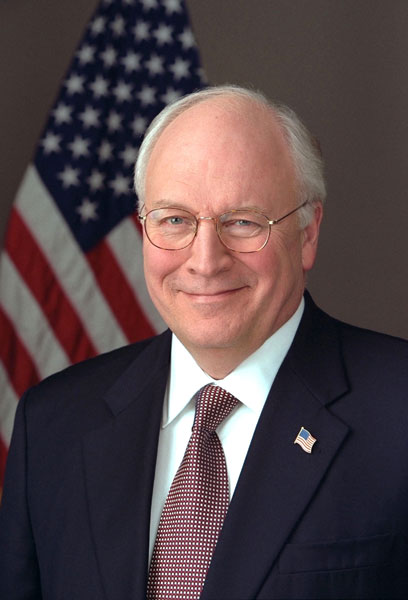So unlike our Presidents list, the rules for Vice President are a little different, their entire political career up until becoming vice president counts....however nothing they did after being Vice President will count, since this is about what made the important vice presidents, not people. (this is also to prevent the list from being populated by presidents who had been VP's)
Also, the rules for electing the Vice President changed in 1804 when the 12th amendment was passed. Prior to 1804 the Vice President was simply the runner up in the electoral college. Which also means the reasoning behind who became Vice President and why also changed in 1804. Therefore in order to ensure an even playing field (and give time to some lesser known VP's) the men who were VP prior to 1804, John Adams, Thomas Jefferson, and Aaron Burr are disqualified. However since the idea usually is that the VP is most important before the election, ALL other VP's including Joe Biden and Dick Cheney are eligible.
One last thing, please take note of the word IMPORTANT. This is not a best or worst list, just a list of Vice Presidents who did something that had a big impact, for better or worse.
First up we have:
 |
| Elbridge Gerry. 5th Vice President under Madison |
On one last thing, it should also be noted Elbridge Gerry is the only person on this list to not have a post vice presidential career of some kind.....because he died 18 months into his term (the second of 7 VP's to die) prompting people everywhere to go "Dude you had ONE JOB! ONE FREAKING JOB! HAVE A HEARTBEAT! AND YOU FAILED!"
Number 4:
 |
| Andrew Johnson. 16th Vice President under Lincoln. |
So somewhat shockingly, given his placement on my worst presidents list, Johnson is actually here for a GOOD reason. If you live in the midwest/great plains, you've likely heard of the Homestead Act, a congressional bill that gave public land to settlers to encourage westward expansion. In fact its arguably one of the main factors for all original US migration west of the Mississippi, and it was all the idea of this guy. In fact he introduced it for the very first time during his first term in office as a congressman in 1843....and basically spent the next 20 years pushing for it in both the house and the senate (with a 4 year break to serve as governor of Tennessee.) In an ironic twist however, Johnson would leave the Senate in 1862 just months before final passage occured. Unlike most of his southern ilk though, Johnson didnt leave due to secession, he actually left to become military governor of occupied Tennessee. As military governor, Johnson, devoted to the Southern way of life (even if he supported the idea of the Union) got an exception for his state from the Emancipation Proclamation, ensuring no matter who controlled which parts of Tennessee after 1863, the whole state could keep their slaves. In another ironic twist, Johnson's final act as Military Governor, before assuming the Vice Presidency, was to sign into law Tennessee's new Constitution.....outlawing slavery forever.
Number 3:
 |
| John C. Calhoun. 7th Vice President under Q Adams and Jackson. |
First he's an AMAZING set of trivia answers, Second (and last) vice president to serve two different presidents, only vice president to serve two different parties, first vice president to resign the office.
And its actually that last one that gets him on this list. People may remember that when I was talking about Andrew Jackson on my worst presidents list, I mentioned he cant even take full credit for his crack down on nullification because his vice president had mainstreamed the whole idea? yea well this is that Vice President. And the idea of Nullification, was one the south pointed to as proof they could legally secede, and that idea had actually more or less entirely Calhoun's. So in a nutshell he's kinda responsible for the civil war.
One other less important, but intended to be more positive thing Calhoun did: before becoming VP Calhoun had been Sec of War, and as such was supposed to oversee relations with native america's. In an attempt to better address relations with them, Calhoun created the Bureau of Indian Affairs inside the War department to draw up treaties with native tribes (which as far I can tell Calhoun assumed [incorrectly] we'd honor).
Number 2:
 |
| Thomas Marshall, 28th Vice President under Wilson |
Thomas Marshall was only the second vice president in history to serve two terms under the same president. The first was Daniel D. Tompkins under James Monroe a century before. But in addition to serving what was at that point a once in a century term, Marshall was also the first modern Vice President.
Most VP's had focused almost exclusively on their role in the legislative branch (as leader of the senate) up until Marshall. Although the Vice President would continue to preside over the senate regularly until Alvin Barkley (VP under Truman), Marshall would be the one to take the first steps to moving the Vice presidency into its modern fit as part of the executive branch. In fact he was the first to be regularly invited to cabinet meetings (although he often didnt attend after the first year or so), and was the first to be used as a surrogate on campaign speeches and later liberty bond/support the war (WWI) propaganda speeches, regularly. This would lead to him being the first Vice President to actually conduct a cabinet meeting after President Wilson left the country to negotiate the Treaty of Versailles ending world war I.
Actually to be honest, Marshall had a chance to BE president in his own right. Not long after returning from europe, Wilson suffered a stoke that left him incapacitated. Many members of congress believed without Presidential leadership the Treaty might fail and "League of Nations" (a fore runner to the UN) certainly would (and did). So they called on Marshall to assume the powers of the President due to Wilson's incapacity. Marshall refused citing the precedent this would set for forcing a president from office for a sickness. (Wilson refused to officially admit to his incapacity, so legally it was if he was only ill). The ensuing battle and unsuress on correct legal policy would eventually lead to language clarifying when the Vice President was required to assume power in the 25th Amendment (paving the way for Bush Sr to assume the mantle of President a few times during Reagan's term while Reagan was undergoing surgeries). How many Vice Presidents do you know of who would pass at a chance to BE president? not to many and that alone makes Marshall remarkable.
However even outside of what he did as VP, Marshall was notable, and a kinda awkward pairing for the racist Wilson. As governor of Indiana, Marshall took a trying to overturn the states Eugenics and Sterilization laws, at the height of such laws popularity in the country (and laws favored by future president Wilson) going so far as to order state institution to NOT comply with the law. He also was opposed to capitol punishment and would pardon anyone sentenced to death during his term, as a result he was the first Governor to execute no one during his term in office. He also helped pass Child Labor laws and Anti corruption legislation during his tenure. All in all he made a rather activist liberal running mate paired with a somewhat conservative racist president.
Number 1:
Most VP's had focused almost exclusively on their role in the legislative branch (as leader of the senate) up until Marshall. Although the Vice President would continue to preside over the senate regularly until Alvin Barkley (VP under Truman), Marshall would be the one to take the first steps to moving the Vice presidency into its modern fit as part of the executive branch. In fact he was the first to be regularly invited to cabinet meetings (although he often didnt attend after the first year or so), and was the first to be used as a surrogate on campaign speeches and later liberty bond/support the war (WWI) propaganda speeches, regularly. This would lead to him being the first Vice President to actually conduct a cabinet meeting after President Wilson left the country to negotiate the Treaty of Versailles ending world war I.
Actually to be honest, Marshall had a chance to BE president in his own right. Not long after returning from europe, Wilson suffered a stoke that left him incapacitated. Many members of congress believed without Presidential leadership the Treaty might fail and "League of Nations" (a fore runner to the UN) certainly would (and did). So they called on Marshall to assume the powers of the President due to Wilson's incapacity. Marshall refused citing the precedent this would set for forcing a president from office for a sickness. (Wilson refused to officially admit to his incapacity, so legally it was if he was only ill). The ensuing battle and unsuress on correct legal policy would eventually lead to language clarifying when the Vice President was required to assume power in the 25th Amendment (paving the way for Bush Sr to assume the mantle of President a few times during Reagan's term while Reagan was undergoing surgeries). How many Vice Presidents do you know of who would pass at a chance to BE president? not to many and that alone makes Marshall remarkable.
However even outside of what he did as VP, Marshall was notable, and a kinda awkward pairing for the racist Wilson. As governor of Indiana, Marshall took a trying to overturn the states Eugenics and Sterilization laws, at the height of such laws popularity in the country (and laws favored by future president Wilson) going so far as to order state institution to NOT comply with the law. He also was opposed to capitol punishment and would pardon anyone sentenced to death during his term, as a result he was the first Governor to execute no one during his term in office. He also helped pass Child Labor laws and Anti corruption legislation during his tenure. All in all he made a rather activist liberal running mate paired with a somewhat conservative racist president.
Number 1:
 |
| Richard Cheney. 46th Vice President under W. Bush |
As if it was going to be anybody else. Dick Cheney is possibly the most powerful and influential VP in american history. Rumors persist that he was basically the senior partner and the one calling the shots during the first term of the W. Bush adminstration. He's credited as the architect of the Iraq war, and many of Bush's other policies during that time. He's also so modern I dont really need to go on about him, EVERYONE knows him and why he's famous. Which is actually unusual for any vice president, even the incumbent, and goes a long way to showing why he tops the list.
In fact the best example of his influence comes from hearing talking heads talk about the period between 2000 and 2008. Its just as often referred to as the "Bush/Cheney Administration" as it is just the stand alone "Bush Adminstration". In fact my prediction is in 100 years, Dick Cheney will still be the only vice president (other than the ones who became president) that any school kid will actually know.
(side note: the reason I dont have a "statue" picture of Cheney like I do everyone else is because the statue doesnt yet exist, not for any reason of bias)
So there you have it, the 5 most important Vice Presidents in history, 2 of whom you know, 2 of whom you likely never heard of, and 1 you likely never knew was VP.
In fact the best example of his influence comes from hearing talking heads talk about the period between 2000 and 2008. Its just as often referred to as the "Bush/Cheney Administration" as it is just the stand alone "Bush Adminstration". In fact my prediction is in 100 years, Dick Cheney will still be the only vice president (other than the ones who became president) that any school kid will actually know.
(side note: the reason I dont have a "statue" picture of Cheney like I do everyone else is because the statue doesnt yet exist, not for any reason of bias)
So there you have it, the 5 most important Vice Presidents in history, 2 of whom you know, 2 of whom you likely never heard of, and 1 you likely never knew was VP.
Wow, I can't tell you how much I love seeing Thomas Marshall at #2. Most articles I see about him have him ranked near the bottom - one primary reason being that he refused to seize the presidency after Wilson's stroke. They also tend to misinterpret his sense of humor for cynicism. More on that in a moment.
ReplyDeleteMy grandmother attended one of Marshall's liberty bond rallies, in October 1918 at Baltimore's 5th Regimental Armory. I wrote children's novel based on her experiences from that time (highly fictionalized, I should point out), and I researched Marshall quite a bit in order to put him in the story.
Today what Thomas Marshall is most remembered for was his remark, "What this country needs is a really good five cent cigar." He knew that the vice presidency had never been a very important job, and he came up with plenty of jokes on the subject. But even if he didn't take the job seriously with his words, he certainly did with his actions.
Thomas Marshall's former home is now the Whitley County Historical Museum in Columbia City, Indiana. I visited it a couple of years ago - you can see some photos from there on my "author website."
http://www.rablack.com/Marshall_House/Marshall_House.html
Hey sorry it took me so long to reply to this.
ReplyDeleteFirst off on the bit about your grandmother that's actually really cool.
Also I think as far as Marshall's humor vs action goes, he was right about the vice presidency. Seems to me the roll the VP usually takes is that of "fall guy" and/or "lovable clown" (which I would apply at minimum to both Dan Quayle and Joe Biden of our recent VP's) no matter how formidable they are, because by taking that roll they can take some of the heat and attention of the President and make it easier for the President to maneuver. Even if, when needed the VP can unleash his full abilities and shift into "attack mode" on an issue, which tends to work much better since people dont expect it.
Clearly I would say Marshall fits that as again does Biden, and a lot of the Vice Presidents in between (Truman, Charles Curtis, Hubert Humphry, Spiro Agnew and HW bush to various extents), although only Marshall Bush and Biden seemed to hit the balance perfectly, and only Marshall and Biden seem determined to convince people they have much less influence than they did/do. So all of that may also be a lasting legacy of the dichotomy you pointed out in Marshall's handling of the VP.
And thanks for the link I think I might need to plan a trip to the Highway of Vice Presidents.